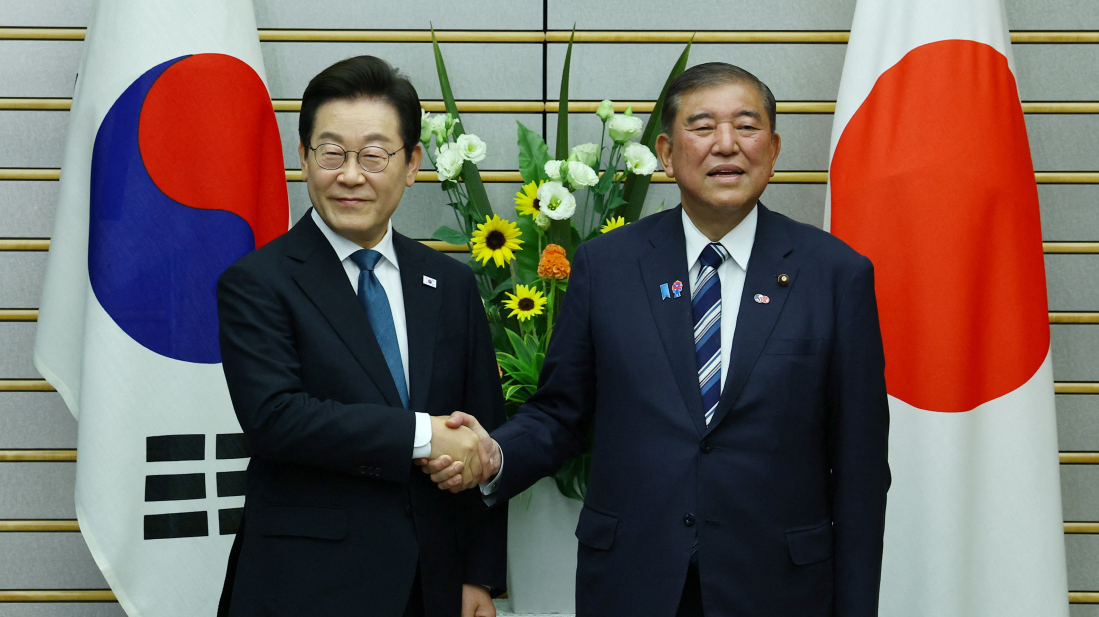Zelenskyy urges global south to “push Russia towards peace”
President Volodymyr Zelenskyy of Ukraine has called on the nations in the global south to “send relevant signals” and push Russia towards peace....

Japanese Prime Minister Shigeru Ishiba and South Korean President Lee Jae Myung reaffirmed their commitment to security cooperation on Saturday, ahead of Lee’s planned summit with U.S. President Donald Trump on Monday.
During his first official visit to Japan since taking office in June, Lee met Ishiba at the prime minister’s residence in Tokyo, where the two discussed bilateral relations, including closer coordination with the United States under a trilateral pact signed by their predecessors.
“Stable relations benefit both our countries and our region,” Ishiba said during expanded summit talks. “It is also crucial that we strengthen our trilateral alliance with the U.S.”
Lee’s surprise election victory—following the impeachment of conservative President Yoon Suk Yeol for declaring martial law—had initially fuelled concerns in Tokyo that ties could deteriorate. Lee has been a vocal critic of previous attempts to ease tensions rooted in resentment over Japan’s 1910–45 colonial rule of the Korean Peninsula.
Last week, Seoul expressed “deep disappointment and regret” after Japanese officials visited a Tokyo shrine honouring Japan’s war dead, which many South Koreans regard as a symbol of wartime aggression. Even so, Lee has signalled support for closer ties, including during his first meeting with Ishiba on the sidelines of the G7 summit in Canada in June.
Despite their differences, both U.S. allies remain heavily dependent on Washington to counter China’s growing influence in the region. Together they host around 80,000 American troops, dozens of warships and hundreds of military aircraft.
“As the international order has been unsettled recently over trade and security issues, I believe South Korea and Japan, which share values, systems and ideology, should strengthen cooperation more than ever,” Lee said during his talks with Ishiba.
In Washington, Lee and Trump are expected to address security concerns including China, North Korea, and Seoul’s financial contributions towards U.S. forces stationed in South Korea-an issue on which Trump has repeatedly pressed for increases.
Japan and South Korea also see eye to eye on trade, having agreed to 15% tariffs on U.S. imports of their goods after Trump threatened to impose higher duties.
A powerful eruption at Japan’s Shinmoedake volcano sent an ash plume more than 3,000 metres high on Sunday morning, prompting safety warnings from authorities.
According to the German Research Centre for Geosciences (GFZ), a magnitude 5.7 earthquake struck the Oaxaca region of Mexico on Saturday.
The UK is gearing up for Exercise Pegasus 2025, its largest pandemic readiness test since COVID-19. Running from September to November, this full-scale simulation will challenge the country's response to a fast-moving respiratory outbreak.
Honduras has brought back mask mandates as COVID-19 cases and a new variant surge nationwide.
Kuwait says oil prices will likely stay below $72 per barrel as OPEC monitors global supply trends and U.S. policy signals. The remarks come during market uncertainty fueled by new U.S. tariffs on India and possible sanctions on Russia.
President Volodymyr Zelenskyy of Ukraine has called on the nations in the global south to “send relevant signals” and push Russia towards peace.
Afghanistan recorded the return of 6,202 refugees from Iran and Pakistan on Friday, officials confirmed.
Argentine authorities carried out raids on several properties on Friday as part of an investigation into an alleged kickback scheme that could implicate senior officials, local media reported.
President Vladimir Putin said on Friday that there was now “light at the end of the tunnel” in relations between Russia and the United States, adding that the two sides were in talks over potential joint projects in the Arctic and Alaska.
President Donald Trump announced on Friday that he intends to nominate Sergio Gor, one of his closest aides, as the next U.S. ambassador to India, where he will be tasked with managing strained ties further complicated by Washington’s plan to double tariffs on Indian goods next week.
You can download the AnewZ application from Play Store and the App Store.

What is your opinion on this topic?
Leave the first comment